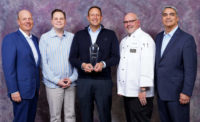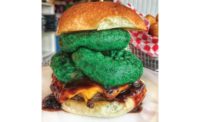More burgers with less handwork

Photo source: Inboden's Gourmet Meats
The hamburger has long had a prominent place in America’s diet. The pandemic only enhanced that, as consumers who grew tired of fixing dinner could turn to their local burger chain for a quick and easy meal. Now that the lockdown portion of the pandemic has (mostly) ended, burgers are still as popular as ever. What has changed is that consumers want to up their burger game.
Retail giant Kroger, in a list of the top food trends it is following for 2022, pointed to a “grocery glow up.” “Cooking at home isn't just about convenience anymore; emulating restaurant and travel experiences at home with upleveled, ‘Instagram- able’ meals is trending today,” the company said. “Consumers are raising the bar when recreating dining experiences at home and have been met with the premiumization of frozen food as well.” It listed its Simple Truth Grass-fed Beef Burgers and Beef Hot Dogs as products that are a part of this trend.
Many of the latest burger offerings to reach store shelves in recent years focus on that premium quality. New products tout Angus beef, or a mix of specific muscles such as the brisket or tri-tip — or a combination of muscles. That level of premium burger is also available to smaller meat processors.
Inboden’s Gourmet Meats & Specialty Foods, located in DeKalb, Ill., offers a variety of specialty burger patties, changing from week to week. There are about a dozen varieties in all, including a mushroom cheddar burger, a Santa Fe burger or a bacon and cheese burger. Tom Inboden, owner, says that the company had been making the patties by hand, which was a tremendously labor-intensive process. He explains that previous attempts to automate burger production resulted in patties that were too chewy. Recently, the company bought an inline grinding system and a flattening system to create burgers with the look and texture of a handmade product.
“We can mass produce these and not get so much protein extraction that the darn things eat like hockey pucks. You want them to eat tender,” he notes.
Inboden’s customers can purchase burger patties from the store’s fresh meat case, or they can purchase packaged patties with a 14-day shelf life. Inboden’s used to offer frozen patties, but it has evolved away from that process. The business has transitioned into a job shop, where it makes premium products like a fresh, gourmet burger patty instead of competing with every other meat processor for pennies in the frozen burger business.
“Hamburger patties are such a commodity that there’s not a large margin in it,” Inboden explains. “We’re providing a service where customers don’t want their burgers frozen, and we can get them an expanded margin through the service that we provide.”
Looking for a reprint of this article?
From high-res PDFs to custom plaques, order your copy today!






